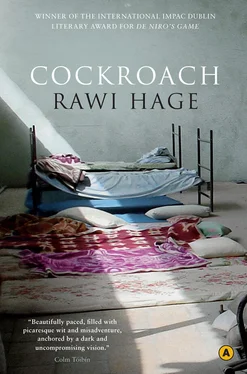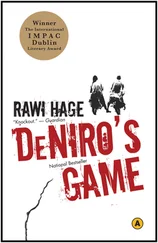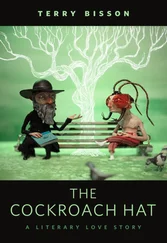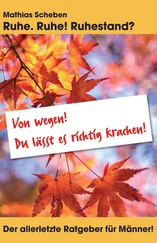I went to the bathroom. In the bowl there was one small piece of toilet paper that had floated and marinated all night in Shohreh’s yellow piss. I stood above it and aimed at it. I made holes in its middle and drove it down to drown, and then I flushed, making sure that the whole building would hear it in their dreams like apocalyptic rain.
I put on my clothes. Shohreh kept apologizing. She gave me my woollen hat and helped me with my jacket and walked me to the door, touching my back. I walked home. I wanted to walk. I refused to take a cab. I wanted to walk and hear crushing sounds under my feet again. Night is the only time when one can impose one’s own sound on the world. In the absence of wolves’ howls, hyenas’ laughs, nightbirds’ songs, and a full moon, it was up to a human to make noises, to fill the void.
But the snow was soft. My steps were muffled. It was quiet, so quiet that I felt as if I did not walk but instead crawled in silence. The snow covered everything and I walked above cotton, on silent carpets, on beach sand. Softness is temporary and deceiving. It gently receives you and gently expels you. I saw no one, no one. No being at all, not even a rabbit, not even the trace of a cougar, crow, or deer, nothing in this northern terrain. I thought: I will tell every tourist I encounter, every sister who has ever received a postcard, that nothing here exists; there is no queen, there are no seals, no dancing bears, moose, cabins, high trees, bonfires. Descriptions of these are all a ploy, an illusion, a conspiracy. There is nothing but that which freezes, and the only way to escape it is to dig deep holes, dig and sail under it. There, my friend, you can encounter rivers of steam, tropical paradises with noisy crickets, crocodiles, muddy rivers, green fungus arching like wallpaper over trees, and expert scuba-diving rats, and troops of roaches receiving signals, conspiring to take over the world. All that exists, all that will ever exist, shall pass through this passageway under the ice, the dead corpses when they turn to dust, the big happy meals, the wine, the tears, the dead plants, the quiet settling storms, the ink of written words, all that falls from above, all that ascends, all that is killed, beaten, misused, abused, all that have legs, all that crawl, all that is erected, all that climbs, flies, sits, wears glasses, laughs, dances, and smokes, all shall disappear into the underground like a broken cloud.
My fingers were frozen, my house keys cold and painful to touch. The lock on the front door of my building was cold, too, and the keys would not twist in the door. I walked back to the street and tied a knot in the key chain. Like a spider, a fisher with a rope, I pulled a thin thread from my sweater and dangled the key down into the sewer, where the temperature was reasonable. I let the metal warm up from the underground steam, then I brought it back up and put it in my mouth, and it quivered like a fish. I ran back to the lock before the key slipped through my lips, before I lifted my neck and swallowed it like a fresh cod in a seal’s throat. I opened the door and took the stairs up to my home. There I took off my shoes, lay down in bed, covered myself, and slept with my clothes on, wishing I was a pony or a tiger.
THE NEXT DAY, the janitor’s wife, the Russian lady from the basement, came up to my door and knocked. She is asleep, she told me. The old lady is asleep. We can take the trunk now.
I rushed to the corner of my bedroom, looking for my socks. I found them. They were damp in the toes, but not wet. I put them on. Then the shoes, which I found under the bed. I pulled the laces and felt pressure on the arches of my feet. I made delicate, perfect knots on both shoes. If I can’t wear a bowtie for a Victorian encounter like this, I thought, a bowtie knot on both feet might compensate. And tidiness, for the occasion. When in Rome do as the Romans, et cetera. And now a light jacket, and I am ready for counter-imperial looting. Excitement was lingering in the corridors, excitement manifested by the rushing of our feet and the smirks on our faces.
We entered the old lady’s apartment. Many of her photographs had turned yellow, and the sepia faces of colonels and waves of desert dunes covered the walls.
Aha! Here it is. The infamous trunk. Yes here, here! The janitor’s wife pointed her finger.
A small dog came up to me and started to sniff around me. Then he started to growl at me.
Give him your hand, the janitor’s wife hissed at me. Give him your hand to sniff.
But before I had the chance, the dog started to bark, calling me names such as “pest” and “intruder” and “thief.”
The lady will wake up, the janitor’s wife said. Hurry up.
The dog was yelping and twisting and blocking the way.
We carried the trunk and started to move towards the door, but at that moment the lady shouted from her bed, Natasha, is that you?
Yes, yes, I am here to take Elvis for a walk. Stay asleep.
Is my husband back? the old lady asked.
He is feeding the horses. Go back to sleep, Natasha said.
But the dog kept on yelping. Put the trunk down. Put it down, Natasha said.
We laid the trunk on the floor. Natasha opened it, grabbed the dog and threw him in, and closed the lid. The barking was now muffled, but the dog must have gone crazy banging his head against the wood inside.
We took the stairs down to the basement. When we arrived at the janitor’s apartment, Natasha opened the trunk. She grabbed the dog, who was whimpering by now, and let him loose in the apartment.
The dog was partly blinded by the sudden light. He sniffed the carpet and the legs of the coffee table. Nothing like darkness to calm an animal down, I said with a wise glance at the creature.
Okay, Natasha said. What do you want to take? You can take only one thing.
There were books and clothes, including a military jacket, letters, and thick leather boots. I tried on the boots. They were a little loose, but that could be fixed with thicker socks, I thought. I flipped through the trunk again and found two pairs of thick socks.
One thing only, Natasha repeated.
Two things, I said. Or shoes and socks count as one thing.
Okay, you take them and go. Before my husband comes home.
I took my loot and crawled back upstairs. On the landing between two floors I sat and took off my shoes and my socks, and wiggled my toes. Making sure that my bare feet didn’t touch the cement, I slipped on the new thick wool socks and the boots. Then I ran down the stairs and out of the building and walked above the earth and its cold white crust, feeling warm and stable.
I WALKED TO Genevieve’s office. The grip of my boots’ soles anchored me more firmly than ever in the soil hidden beneath the street’s white surface.
Genevieve and I sat as usual, facing each other. There were a few seconds of silence between us. I put each of my hands on a chair arm. I crossed my legs and moved my feet in my boots, bending them forwards, backwards, and twirling them a bit, thinking of the old lady’s husband marching to confront his enemies beyond the trenches and muddy battlefields. Now that I had laced my feet into boots, blood, and mud, this health clinic had started to feel homier. The door was open to the hallway and Genevieve sat across from me, looking into my eyes. She always started with an assessment: you look tired, happy, sad, or good. And I knew her words had no relevance, no connection to how I looked; they were always just an excuse to start the conversation. I usually nodded and I always agreed, but I also knew I could look like all of the above at the same time, as if I were a cocktail of emotion that was not defined, that had no scientific term, that needed a new space to exist in, a kind of a purgatory that no medical paper had ever described.
Читать дальше












